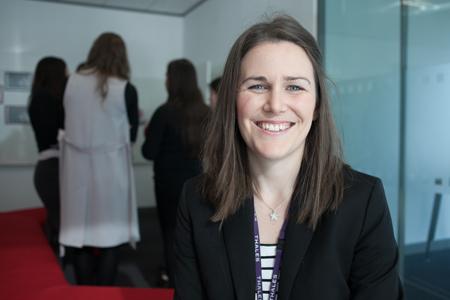Spotlight on Kim Abbott

At 27 years of age, Kim Abbott has already founded three social enterprises, represented Australia at the UN, and was recently recognised by the Telegraph and WES (Women in Engineering Society) as one of the Top 50 Women in Engineering under 35. We talked to Kim about this recent award as well as her work both here and abroad.
What does your role in Thales currently involve?
My job is working within the UK Innovation Hub to help the business identify and develop the next new markets, products and services.
Congratulations on recently being recognised as one of the Top 50 Women in Engineering under 35. What does this accolade mean to you?
When I first found out, I emailed the awarding body to make sure it wasn’t a mistake! It was overwhelming to have received recognition, in general and also considering I’m Australian and only recently been living in the UK. After reading through the list of those awarded, and attending the ceremony, it made me realise the recognition wasn’t about being British; it was about who has made, and continues to make, contributions to engineering in the UK and beyond.
GCSE courses in design and technology have disappeared from nearly half of schools in the UK amid pressure to succeed in core compulsory subjects, such as English, Maths, Languages, Geography/History, mainly due to lack of funding. Do you have any ideas on how to address this?
Whatever approach is taken, it has to be a complete and collaborative end to-end-strategy. Parents, academia, industry and government all need to play a role. By the time a girl is eight, she has decided whether she likes Science or Maths and, with the two most significant influences in the decision making processes being family and peers, it’s critical that we get involved at the right time. Thales does a fantastic amount of work at schools but we need to figure out how to also extend this impact into the home. Another issue we need to consider is retention of female engineers – how do we keep them once they’re in the field?
What advice would you give about choosing engineering as a career?
When I visit kids at schools, I tell them that engineering is a way of thinking; it’s all about problem solving. I couldn’t have done my work in India with ROKA (a social business that empowers women in rural India) without my engineering skills as I wouldn’t have had the knowledge of how to analyse and subsequently come up with solutions. It’s important that we make Science and Maths subjects real and tangible so students can see the application in a real-world environment, how they can solve the problems of the world, and hopefully get inspired to get into careers in STEM.
Can you tell us more about the work you’ve undertaken for social economic empowerment for women?
Economic empowerment is something I’m very passionate about and it’s what inspired my work in India and at the UN, but I also believe the most powerful and effective resource in the world isn’t money, its people. In this day and age, we have so many resources freely available that all you need to effect real change is a desire and drive to make a difference.
Have you had any mentors throughout your career?
I’ve had a range of mentors throughout my career, all of who have helped me in an invaluable way. I’d suggest to any young person that finding themselves a mentor is critical and a great way to get guidance and insight into your career, and yourself. I’m incredibly lucky that I’ve always had exceptionally good mentors, most of whom are women, most who I still have relationships with today.
Do you think Thales provides an inclusive environment for female engineers?
I do. Particularly the supportive network of female engineers we have at Thales. In saying that, it’s important to keep striving for improvement. To make a more inclusive environment that embraces diversity, it’s about making sure that nobody’s views, thoughts and contributions are excluded. The best thing we can do to is to recognise potential and utilise people.
You’ve been here for 18 months now - any plans to move back to Australia?
There aren’t any plans to move back just yet. I’m really happy with how my career is progressing and the opportunities that are available here in the UK. And the weather really isn’t that bad!
How did you find the transition to the UK?
Moving was of course an adjustment but I live outside of London which helps me stay close to one thing I miss from home – open space.
Your career so far has been quite creative. How do you join this concept of being creative with being a technical engineer?
Creativity is the birthplace of innovation. If we create environments that give people the space and time to be creative, give them exposure to different experiences, you will create a culture that fosters innovation.